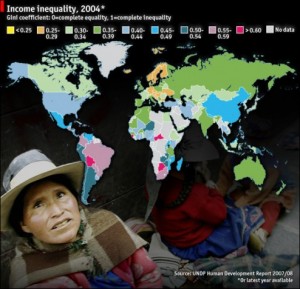By Conor Godfrey
All countries with a colonial history struggle with the psychological and economic impact of colonialism.
In many African countries, colonial masters empowered one people group over another and left a legacy of racial or tribal inequality that persists to this day.
This legacy is particularly potent in South Africa, where the gap between haves and have-nots remains among the worst in the world.

Dealing with inequality is a complicated and emotional issue. As I see it, African governments can frame policies aimed at addressing inequality in two ways– righting old wrongs, or growing the economy.
Zimbabwe recently revived its 2007 Indigenous and Empowerment Act aimed at redistributing wealth and skills to indigenous Zimbabweans.
This is clearly of the ‘righting old wrongs’ variety, much like the government’s efforts at land reform over the last decade.
In 2000, the government participated in the seizure of 110,000 Sq Kilometers of farmland for redistribution.
Many of these farmers were neither re-settled nor reimbursed.
These ill-fated land reforms further eviscerated the production capacity of the former “bread Basket of South Africa”, and their memory casts a long shadow over the present indigenous empowerment legislation.
The current manifestation of the Indigenization and Empowerment Act would require foreign owned businesses valued over US$500,000 to sell or cede 51% of their business to indigenous Zimbabweans.
It would also require all companies to “procure 50 % of all [their] goods and services… from a business in which a controlling interest is held by indigenous Zimbabweans.” (Text of Indigenization and Empowerment Act)
Businesses and investors are fleeing for the hills.
The head of a large German investment group, Andreas Wenzel, was quoted as saying that, “Prompted by the recently introduced regulations… the German-Southern African Chamber of Industry and Commerce in Johannesburg are putting on hold their plans to bring German investors to Zimbabwe”.
Contrast this with South Africa’s Broad Based Black Economic Empowerment initiative (BBBEE).
The Department of Trade and Industry claims that Black empowerment and growth go hand in hand in South Africa—”This will only be possible if our economy builds on the full potential of all persons and communities across the length and breadth of this country.”
While the ANC has been guilty of populist pandering in the past, I do not believe that this policy deserves that criticism.
The BBBEE in South Africa rates companies on a BBBEE scorecard, awarding points for the percentage of Black senior managers, owners, and employees, as well as awarding companies points for doing business with other high scoring companies.
If you want to do business with the government (a huge purchaser of goods and services in the South African economy), then you must score well.
In this way, the South African government uses their buying power to encourage companies to find qualified black personnel and business partners.
From 2000 to 2008, BBBEE transactions accounted for 200 billion Rand.
Even though claims of reverse discrimination abound, the South African government rightly understands that developing the human capital of the entire rainbow nation is crucial to the country’s growth and success.
Righting old wrongs by throwing untrained and under financed indigenous people on previously profitable land, or forcing shotgun weddings between foreign firms and potentially unprepared indigenous partners, will only make everyone poorer.
One thought on “Righting Old Wrongs Does Not Need to Destroy the Economy”